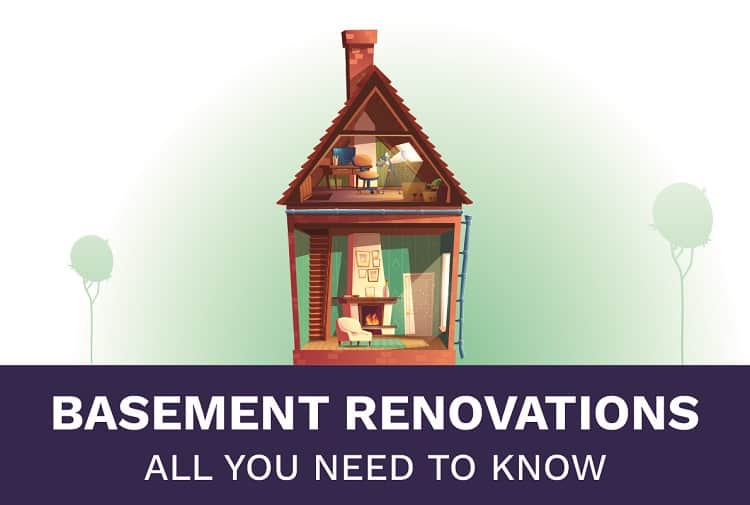A basement renovation can almost double the functional living space in your home. Whether you are developing an unfinished basement or are remodeling a dated basement, basement renovations are an excellent investment.
The latest data on the cost vs. value of a basement renovation, as found here, shows that a basement reno can recoup about 70 percent of its cost. That means that if you spend $70,000 on a basement development, you can increase property value by about $50,000. That’s a great return. The basement renovation example in the report included a 20 by 30-foot entertaining area with a wet bar, full bathroom, and a partition to enclose the mechanical room.
Things to consider before you start
Basement renovations are different than a main floor remodel. There are additional factors to consider when renovating below grade. Skipping essential steps can be a costly mistake. Considering humidity and moisture issues, basement-friendly finishing products, budgets, and unique design ideas are essential.
Look for moisture problems
Moisture and dampness is a common problem in basements. If your basement has a significant problem, it’s vital to pinpoint the problem and fix it before any walls go up. Otherwise, you could risk water damage to your newly renovated space. It can also create a health issue if mould or mildew starts to develop behind the walls.
A basement renovation contractor will inspect the entire basement for leaks and moisture issues. Leaky pipes, cracks in the foundation wall, leaky windows, and general humidity from outside can all be culprits. After the inspection, any problems are fixed before the rest of the renovation starts.
Height of the basement ceiling
Mechanical systems need to run through the basement. HVAC ducts, plumbing, and electrical conduits all need space. Hiring the right basement reno contractor will ensure that they are either installed or moved to not intrude on headspace. A well-planned basement renovation design will put any lower ceiling sections outside of where people will walk most often downstairs.
If you live in an older home, your basement may have a lower ceiling than new homes. If possible, your ceiling can be renovated to allow for a few inches of additional headspace. Raising the ceiling a bit is something you can discuss with your basement renovator.
Roughing in plumbing
If you are putting a bathroom addition in the basement, you’ll have to consider the plumbing. New lines will have to be roughed in and connected to the drain on the floor. For the most efficient and cost-effective plumbing retrofit, your contractor might suggest placing the bathroom nearest to existing plumbing, if possible.
Create a basement design plan
Your new basement renovation should meet all your needs for function and aesthetics. Hiring a professional contractor will give you access to a design team for your renovation. You should never embark on a major basement renovation without a detailed plan in place first. Here are some things to consider:
How do you want to use the basement?
Ask yourself what your home is missing and how your basement renovation can help fill that gap. Do you need additional bedrooms for a growing family or visiting guests? Do you need an additional bathroom? Have you always wanted a home theatre? How about a home office? Are you renovating to have a legal secondary suite for an additional revenue stream?
Once you’ve determined what you need your basement to have, the designers can get busy creating a plan that will best meet those needs.
Include storage spaces in your basement design
Not renovating to accommodate your storage needs will be a regret down the road. Some things cannot be stored outdoors in the garage or shed. Consider your current storage situation, how it might change in the future, and be sure to include a storage room or two downstairs.
Consider your budget
When creating your plan, you’ll have to have a set budget. A clear budget will allow your basement renovation contractor to create a design plan that gives you what you want within what you want to spend. They will be able to make suggestions to reduce costs or recommendations on certain aspects of the renovation that will need more spending.
A turnkey basement renovation cost can cost between $20,000 to $60,000 for an average basement remodel. A larger basement or more high-end basement renovation can cost $100,000 or more. For the most accurate cost estimate for your basement reno project, contact Custom Basement Development.
Choosing materials for your basement renovation
As mentioned, some materials are better suited to the basement than others. Because basements are more prone to flooding and moisture than an above-ground floor, be careful not to choose materials that will be damaged when wet.
Flooring for the basement
The best flooring options for the basement should be water-resistant and easy to repair. Hardwood flooring is not the right choice for the basement. Hardwood can easily warp, crack, or expand when in contact with moisture. An unfortunate flood will destroy hardwood, and your investment will be lost. Laminate flooring is also absorbent and not water-resistant enough for the basement.
Choose a flooring material that is durable and resistant to moisture and water. The best flooring options for the basement include ceramic tile, vinyl plank or vinyl tile, or carpet. If you choose ceramic tile, you can also opt for in-floor heating. Hydronic heating in the basement will remove the chill from the floor and be warm and cozy underfoot!
Finishing the walls in the basement
Drywall is the best material to use for your basement walls. While paneling was widely used decades ago and is less expensive to install, it won’t look as nice or give a good investment return. There are different types of drywall available. Ask your basement renovation contractor about moisture and rot-resistant drywall, especially for in the bathroom. These hardier, moisture-resistant drywall products will better stand up to humidity or moisture problems downstairs.
Windows for basement bedrooms
If you include bedrooms in the basement, they must have full-sized egress windows to be considered a legal sleeping space. These windows are easy to open and are considered a fire escape route. Plus, larger windows will let in more natural light, which is always a plus for downstairs.
Hire a professional for basement renovations
There are some jobs that you can DIY when you renovate. Basement remodels do require work that is better left to certified professionals. For example, installing or retrofitting electrical, plumbing, or HVAC components should never be attempted by yourself. Neither should framing or installing drywall, as simple mistakes can have expensive consequences to fix.
There are a few jobs you can consider DIY to cut costs. Those include removing old products, clean up and prep work, and even painting if you’re handy with a roller and brush. Ask your contractor what they recommend for DIY portions of the job.
While DIY can help save money on labour, it might invite costly mistakes that a seasoned professional could help prevent. Your basement renovation will have better results and a long-term value and return on investment when done professionally.
Get started on your basement renovation.



